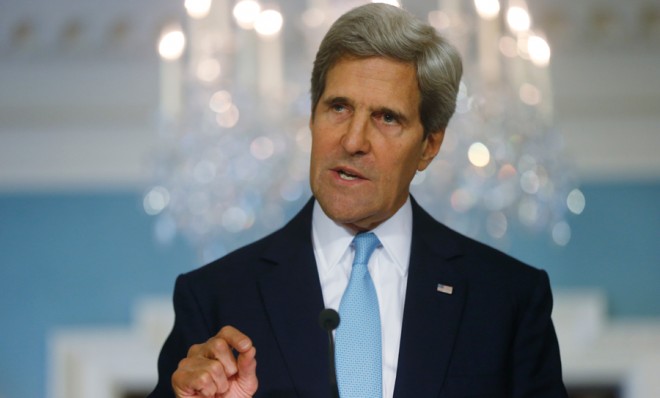WATCH: John Kerry makes forceful case for attacking Syria
The secretary of State calls Bashar al-Assad a "thug and a murderer," and says the U.S. is confident Syria launched chemical weapons that killed 1,429 people

A free daily email with the biggest news stories of the day – and the best features from TheWeek.com
You are now subscribed
Your newsletter sign-up was successful
Visit NBCNews.com for breaking news, world news, and news about the economy
Secretary of State John Kerry said Friday afternoon that the United States was very confident that the regime of Syrian President Bashar al-Assad was responsible for the chemical weapons attack that hit the Damascus suburb of Ghouta last week.
Kerry claimed that a "preliminary U.S. government assessment determined that 1,429 people were killed" in the attack, including 426 children. That is higher than the initial death count estimated by opposition forces, which ranged from 213 to 1,300.
The Week
Escape your echo chamber. Get the facts behind the news, plus analysis from multiple perspectives.

Sign up for The Week's Free Newsletters
From our morning news briefing to a weekly Good News Newsletter, get the best of The Week delivered directly to your inbox.
From our morning news briefing to a weekly Good News Newsletter, get the best of The Week delivered directly to your inbox.
(MORE: The war in Syria: A brief timeline)
"In all of these things that I have listed, in all of these things that we know — all of them — the American intelligence community has high confidence, high confidence," Kerry said. "This is common sense. This is evidence. These are facts."
Kerry said this evidence shows that the Syrian military was preparing for the attack three days in advance, and that some military personnel had been warned beforehand to wear gas masks. He also tried to debunk claims by the Syrian government that rebels might have been the ones to use chemical weapons in Ghouta:
We know where the rockets were launched from, and at what time. We know where they landed, and when. We know rockets came only from regime-controlled areas and went only to opposition-controlled or contested neighborhoods. [via the Washington Post]
For four days afterward, the regime "shelled the neighborhood in order to destroy evidence," Kerry said.
A free daily email with the biggest news stories of the day – and the best features from TheWeek.com
Does that mean the United States is launching a military attack against Syria?
Kerry didn't explicitly say so. Instead, he called Assad a "thug and a murderer," and said that other countries like Iran and North Korea were "watching to see if Syria can get away with it, because then maybe they too can put the world at greater risk."
He said that the "United States of America makes our own decisions on our own timelines, based on our values and our interests," and that any decision President Obama "might decide to take" would be "limited," and would "not involve any boots on the ground" or "be open ended."
If the United States does take military action, it might have to do so without the U.K., where the British Parliament voted against taking any military action against Syria. The United States' closest ally right now is France — an ironic twist in light of the run-up to the Iraq War.
"France will be part of it," French President Francois Hollande told reporters. "France is ready."
Keith Wagstaff is a staff writer at TheWeek.com covering politics and current events. He has previously written for such publications as TIME, Details, VICE, and the Village Voice.
-
 James Van Der Beek obituary: fresh-faced Dawson’s Creek star
James Van Der Beek obituary: fresh-faced Dawson’s Creek starIn The Spotlight Van Der Beek fronted one of the most successful teen dramas of the 90s – but his Dawson fame proved a double-edged sword
-
 Is Andrew’s arrest the end for the monarchy?
Is Andrew’s arrest the end for the monarchy?Today's Big Question The King has distanced the Royal Family from his disgraced brother but a ‘fit of revolutionary disgust’ could still wipe them out
-
 Quiz of The Week: 14 – 20 February
Quiz of The Week: 14 – 20 FebruaryQuiz Have you been paying attention to The Week’s news?